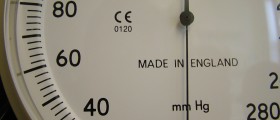
Systolic Blood Pressure – Background
For those who are not yet familiar with the more technical side of this term, blood pressure stands for the amount of force that is exerted by the blood upon the blood vessel walls. All the processes that take place in our body during heart’s regular activity are all together united under the name of cardiac cycle. When it comes to systolic blood pressure, it refers to the maximum amount of pressure that is gathered in the arteries in the course of the cardiac cycle. This happens during heart’s regular contractions/beats while pumping the blood. This particular blood pressure is the one that is measured on your each visit to the physician and is recorded in mmHg (i.e. millimeters of mercury). As far as the measurement technique, in most cases the ausculatory method is used.
There are numerous things that can affect the regularity and proper blood pressure, such as various medications, disorders urological and cardiovascular in nature, different neurological conditions and factors psychological in nature, e.g. anger and stress. Aside from these, such factors as bad diet and bad posture can have a say in the entire matter.
Healthy Systolic Blood Pressure Levels
When it comes to numbers, a person is considered to have a healthy systolic blood pressure if it ranges in between 90-135 mmHg. On the other hand, diastolic pressure is healthy if ranging between 50-90 mmHg. In case a person in question has his/her pressure constantly surpassing the 120 mmHg mark, this is a sign that the person in question should see the doctor right away, with no hesitation whatsoever. This is especially the case, if a person belongs to the middle-age or senior category.
High Blood Pressure – Background Information
This condition, often referred to with a following abbreviation – HBP, is serious in nature and is one of the possible causes of coronary disease, heart and kidney failure, stroke and other similar heart-related problems. Given the fact that blood pressure refers to the force that blood uses to push against the arteries’ walls while the heart pumps the blood out, in case this pressure increases significantly and remains as such for quite some time, it can cause serious damage to the entire body.
Blood Pressure Levels (Systolic and Diastolic)
Normal – less than 120 and less than 80
Pre-hypertension – 120 to 139 or 80 to 89
High Blood Pressure: 1st Stage – 140 to 159 or 90-99
2nd Stage – 160 and higher or 100 and higher

















Your thoughts on this
Loading...